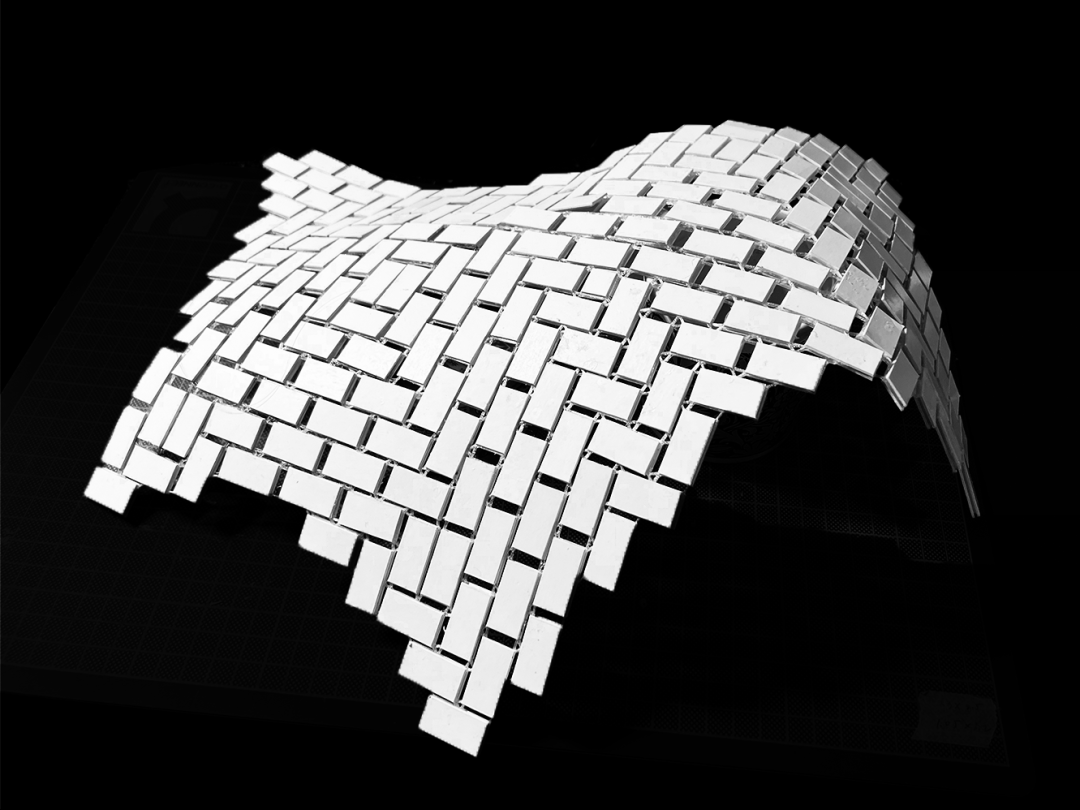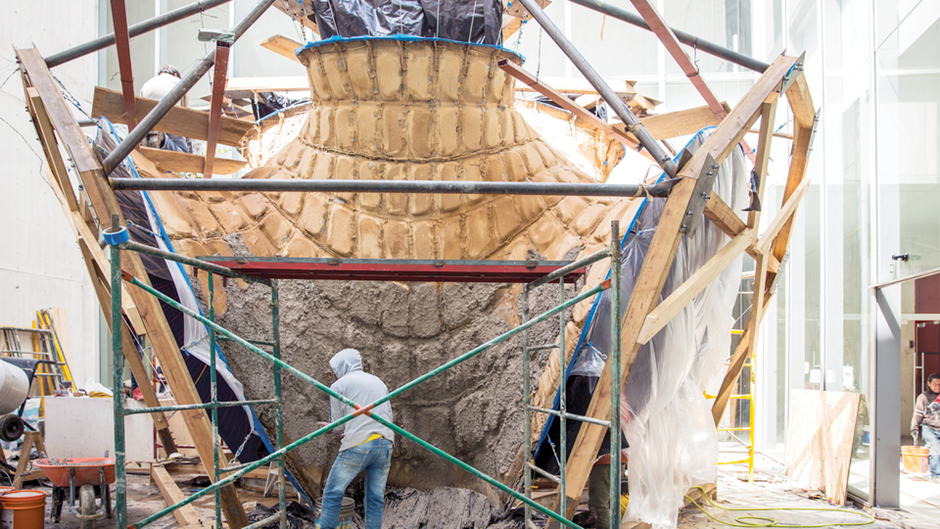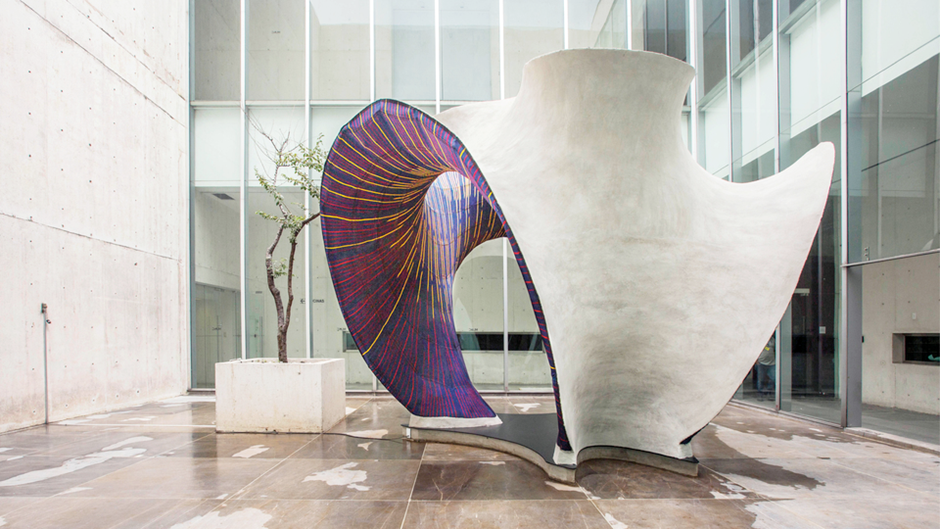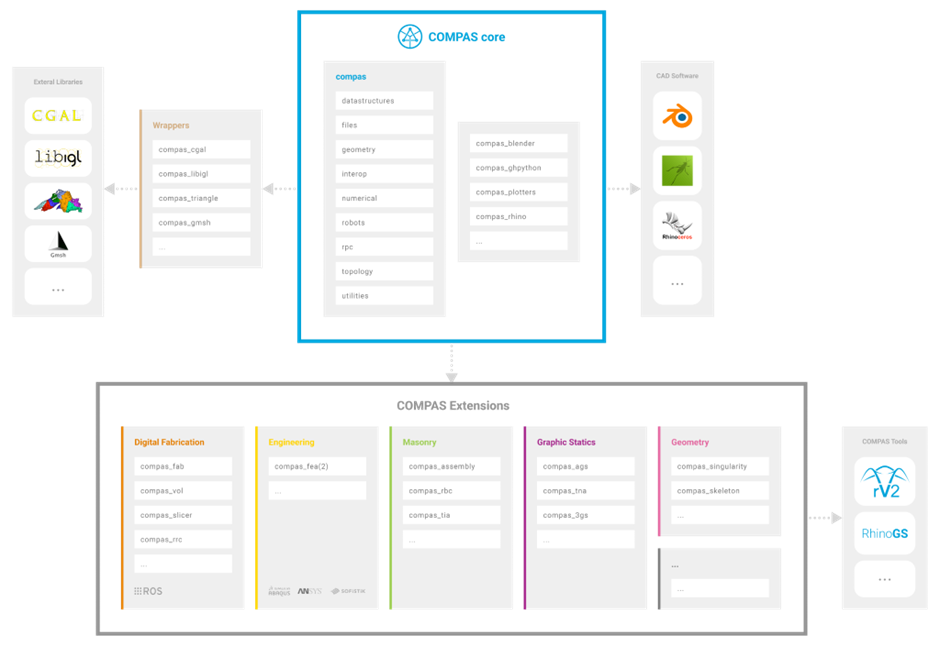新闻中心


基于织物的
拱壳设计与建造
数字设计建造| 线下工作营 | 英文

主题
在高速发展的建筑数字化时代,如何应用尖端的计算机辅助设计和数字制造工具,充分利用智能几何体使得建造更加高效?在向建筑的全生命周期数字化整合迈进的同时,下一代建筑师、工程师和建造者如何协作以实现更加循环可持续的经济?这个工作坊旨在提供对这一变革性未来的一瞥。壳体是高效率的结构体系,它们可以激发简单材料的潜力。壳体通过几何形态提供强度,而非材料能力。虽然这种壳体的设计和施工都因其几何复杂性而具有挑战性,但最新的结构计算和数字化建造工具发展提供了迎接这些挑战的机会,形成了一种创新和可持续的结构设计与建造范式。
内容
参与者将学习使用开源的计算机辅助设计框架compas。此外,我们还将探讨如何使用compas作为中心,无缝连接外部计算平台,完成结构分析和环境影响评估等任务,得到实时反馈结果,用于指导和自动化我们的设计决策过程。工作坊将分为两条平行线展开:一是设计部分——我们将学习如何使用compas完成及结构生形、物化和建造的流程, 并以小组为单位设计自己的壳体一是建造部分——我们将实现一个独特的全尺寸研究原型。
成果
工作坊旨在将参与者置身于设计形式、计算性系统构建、算法实现和数字化建造的全流程中,不仅培养单一结构设计策略的熟练度,而且提供全景式数控制造体验。在这个工作坊中,我们将共同实现一个使用灵活的编织定位模板和薄瓷砖的全尺寸砖壳结构。
所需技能
具备中等水平的rhino三维建模知识,基本的python编程知识,具备compas知识为佳
所需软件
rhino、anaconda
所需硬件
笔记本电脑(至少需要windows 10系统)
人数限制
线下15人
日程安排
day 1
2023/6/25
上午:欢迎和介绍;下午:compas安装和基本教程
day 2
2023/6/26
整个一天:结构找形教程
day 3
2023/6/27
上午:制作及设计评估讲座;下午:实体化教程
day 4
2023/6/28
自主工作时间; 制作和施工
day 5
2023/6/29
自主工作时间;制作和施工
day 6
2023/6/30
上午:自主工作时间;下午:设计评审
团队背景
苏黎世联邦理工学院建筑技术研究所的block研究小组(brg)由philippe block教授和tom van mele博士领导。brg的研究集中在几个核心领域,包括砌体结构分析、基于图解静力学的图形分析和设计方法、计算性生形和结构设计、离散元素拼装以及数字化加工与建造技术。block研究小组以几何学为基础,中心目标是理解复杂结构设计和工程问题的实际需求,并开发新的算法和高效、易于访问的工具,以实现结构信息化设计。
the block research group (brg) at the institute of technology in architecture at eth zürich is led by prof. dr. philippe block and dr. tom van mele. research at the brg focuses on several core areas, including analysis of masonry structures, graphical analysis and design methods, computational form finding and structural design, discrete element assemblies, and fabrication and construction technologies. the central goals of our geometry-based approach are to understand the real demands of complex structural design and engineering problems and to develop new algorithms and efficient, accessible tools for structurally informed design.
导师团队
philippe block
eth zurich,
full professor,
chair of architecture and structure
philippe block是苏黎世联邦理工学院建筑技术研究所的教授,与tom van mele博士共同领导区块研究小组(brg)。他是瑞士国家研究能力中心(nccr)的主任,也是ochsendorf dejong&block(odb engineering)的创始合伙人。block在比利时自由大学布鲁塞尔分校(vub)和美国麻省理工学院(mit)学习了建筑和结构工程,并于2009年获得博士学位。brg的研究集中在计算形态发现、曲面结构的优化和建造,专门研究不加筋的砖石拱顶和混凝土壳体。在nccr内,brg的研究人员开发了创新的结构信息化定制预制策略和采用数字制造的新建造范例。通过brg和odb engineering,block将他的研究应用于不加筋砖石历史遗迹的结构评估和新型壳体结构的设计和工程实践中。
philippe block is professor at the institute of technology in architecture at eth zurich, where he co-directs the block research group (brg) together with dr. tom van mele. he is director of the swiss national centre of competence in research (nccr) in digital fabrication, and founding partner of ochsendorf dejong & block (odb engineering). block studied architecture and structural engineering at the vub, belgium, and at mit, usa, where he earned his phd in 2009. research at the brg focuses on computational form finding, optimisation and construction of curved surface structures, specialising in unreinforced masonry vaults and concrete shells. within the nccr, brg researchers develop innovative structurally informed bespoke prefabrication strategies and novel construction paradigms employing digital fabrication. with the brg and odb engineering, block applies his research into practice on the structural assessment of historic monuments in unreinforced masonry and the design and engineering of novel shell structures.
杜超瑜chaoyu du
eth zurich,
scientific assistant
杜超瑜(chaoyu du)是一位对计算设计、数字制造和20世纪现代建筑和工程历史感兴趣的建筑师和设计师。她在同济大学完成了建筑学学士、硕士学位(m.arch),在柏林工业大学获得了城市设计双硕士学位(m.sc),并在eth在获得了建筑和数字制造及计算机科学方向深造mas学位。她于2020年加入了block研究小组,专注于混凝土壳体结构的计算设计和数字化制造。
chaoyu du is an architect and designer with interest in computational design, digital fabrication, and the history of 20th-century modern architecture and engineering. she completed her diploma in architecture at tongji university (m.arch), a dual master's degree in urban design at technical university of berlin (m.sc), mas in architecture and digital fabrication and cas in computer science at eth. she joined block research group in 2020, with a focus on computational design and fabrication of shell structures.
刘一歌yige liu
southeast university,
postdoctoral fellow
刘一歌(yige liu)是东南大学建筑学院建筑算法与应用研究所的博士后研究员。她在同济大学获得了建筑学博士和硕士学位,并在东南大学获得了建筑学学士学位。她还曾在麻省理工学院作为访问学生(2016-2017)进行学习。刘一歌的研究重点是运用现代纺织技术和先进纤维材料进行数字化建造。目前,她正在探索基于编织技术的建筑几何、性能和功能的新可能性,并尝试将设计过程、制造过程和材料过程整合到建筑生产中。
yige liu is a postdoctoral fellow at the institute of architectural algorithms & applications, school of architecture, southeast university. she received her doctorate and master's degree in architecture from tongji university and her bachelor's degree in architecture from southeast university. she was also a visiting student at the massachusetts institute of technology (2016-2017). yige's research focuses on digital construction with modern textile technology and advanced fiber materials. currently, she is exploring new possibilities of architectural geometry, performance and function based on knitting technology, and tries to integrate the design process, the fabrication process and the material process for architectural production.
陈骊li chen
eth zurich,
phd
陈骊是瑞士苏黎世联邦理工学院(eth zurich)block research group的博士研究员。他的研究重点是aec(建筑,工程和施工)行业和通用计算几何应用的通用数据模型和软件架构。他的教育背景涵盖建筑学、计算机科学和机器人技术。在英国伦敦建筑协会学院(architectural association school of architecture)毕业后,他曾在美国纽约bitonti工作室担任首席计算设计师,同时还在纽约的lexset.ai担任ai生成顾问。在此期间,他参与了与google、intel、adidas和ikea等众多行业领先的客户相关的计算设计和ai项目。从2019年到2022年,他在block research group任职软件工程师,隶属于nccr数字制造中心。他目前是compas协会的董事会成员,同时也是软件咨询公司aesynthetic gmbh的创始人。
li chen is a phd researcher at block research group, eth zurich. his research focuses on universal data model and software architecture for aec (architecture, engineering and construction) industry and for general-purpose computational geometry applications. his educational background was in architecture, computer science and robotics. after graduated from architectural association school of architecture in london, uk, he worked as principal computational designer at studio bitonti in new york, united states, at the same time as generative ai consultant at lexset.ai, also in new york. during this period, he was involved in computational design and ai related projects with numerous industry leading clients such as google, intel, adidas and ikea. since 2019 until 2022, he worked as software engineer at block research group, affiliated with nccr digital fabrication. he is currently on the board of directors at compas association, he is also the founder of software consulting company aesynthetic gmbh.
案例


knit candela

tile vault at eth zurich

compas framework
workshop admission
knitted tile vaults
digital design & fabrication | physical workshop | en
topic
in this era of rapid digitalization in the aec industry, how can cutting-edge computational design and digital fabrication tools enable us to build more efficiently harnessing the power of smart geometry? moving towards a full, digital integration of all phases of a building’s life cycle, how will the next generation of architects, engineers and builders coordinate projects in order to achieve a more circular and sustainable economy? this workshop aims to provide a sneak peek into such a transformative future. funicular shells are structurally efficient and allow the activation of simple materials. the curvature of the shells provides strength through geometry rather than material capacity. while both the design and construction of such shells are highly challenging due to their geometrical complexity, the latest advances in computational tools offer opportunities for overcoming these challenges and creating innovative, sustainable structures.
content
during this workshop, we will work together to realize a full-scale demonstrator of a funicular masonry shell utilizing a flexible, knitted, stay-in-place formwork and thin tiles. the participants will learn how to use the open-source computational design framework compas to develop algorithms for funicular form finding, materialization and fabrication. on top of that, we will also explore how to use compas as a central hub to seamlessly connect to external computational platforms for tasks such as structural analysis and environmental impact assessment, with the outlook of using these results as real-time feedback to inform and automate our design decision-making process. the workshop will be conducted in two parallel tracks: a hands-on component where participants will assist in the realization of a unique first-of-its-kind research prototype at full scale, and a digital component where they will be introduced to the rapidly expanding computational geometry ecosystem of compas, along with several key plugins such as rhinovault3 and formfinder.
required skills
medium-level knowledge of 3d modeling in rhino, basic knowledge of python programming, knowledge in compas is a plus
required software
rhino, anaconda
required hardware
pc
number of participants
maximum number of participating students: 15
schedule
day 1
2022/6/25
morning: welcome and introduction; afternoon: compas basic tutorial & installation
day 2
2022/6/26
entire day: form finding tutorial
day 3
2022/6/27
morning: design assessment lecture; afternoon: materialisation tutorial
day 4
2022/6/28
self-working time; fabrication and construction
day 5
2022/6/29
self-working time; fabrication and construction
day 6
2022/6/30
self-working time; fabrication and constructiondesign review
加入工作营
join us

更多工作营信息可访问:
www.digitalfutures.world/